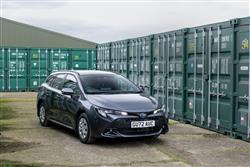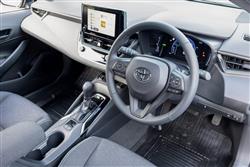Toyota Corolla Commercial - ABC Leasing
How will you view?
This is a sample, showing 30 seconds of each section.
COMMERCIAL BREAK(some text hidden)
By Jonathan Crouch
Ten Second Review word count: 51
Toyota pioneered full-Hybrid self charging power in the LCV segment with this Corolla Commercial van. It's otherwise an LCV which in concept is anything but pioneering, based entirely on the Corolla Touring Sports estate. But for the right kind of company customer, it could be ideal. Especially in this improved form.
Background word count: 165
The commercial vehicle market offers quite a lot of electrical engine options these days: mild hybrid, plug-in hybrid and EV powertrains are all available, should you want them. What the LCV sector's been lacking though, is the kind of powertrain that right here, right now, arguably makes most sense for a van operator: a self charging full-Hybrid petrol engine. It's the kind of 'Prius'-like powerplant that Toyota has long championed, so it is perhaps fitting that Toyota took the lead in offering it in a van, this one, the Corolla Commercial. The innovation pretty much ends there though, because the Corolla Commercial is nothing more than a Corolla Touring Sports estate with the rear seats removed to create a loading area. Still, that could be all some companies like couriers might need. Launched in 2021, this model was updated in early 2023 with a vastly improved version of its 1.8-litre self-charging Hybrid engine, enhanced media tech and improved safety standards. Let's check it all out.
Driving Experience word count: 354
After using this Corolla Commercial for a bit, you might wonder why full-Hybrid self charging engines like the one used here are otherwise absent from the LCV segment. This kind of powerplant makes so much sense, particularly in the case of the revised version of this 1.8 hybrid system, which in this updated form gets redesigned power control unit and transaxle designs, plus a more powerful lithium-ion battery and calibration to achieve a more rewarding driving experience, with a closer relationship between the driver's use of the accelerator and the drive force delivery. That's helpful but if you're used to a small diesel in your small van, you'll still have to adapt a bit to the way that big throttle inputs cause a flare of revs as the Hybrid system initially struggles to translate into rapid forward movement. And you'll also need to accept a vast reduction in mid-range pulling power; this engine's very modest 142Nm torque output is about 40% down on what you'd get from a typical 1.5 or 1.6-litre rival small diesel unit, something you'll really notice in give-and-take motoring; overtakes have to be planned much further in advance. Still, the changes to this engine have undoubtedly made a lot of difference, as has the power increase from 120 to 138bhp, bringing a 1.7-second reduction in the 0-62mph time - to 9.4 seconds. Top speed is still limited to 112mph. Expect refinement to be excellent; certainly far better than it would be in a rival rumbly diesel. As before, the Hybrid engine is matched to a belt-driven CVT auto transmission with six speeds. Toyota provises a button to allow this van to run on electric power in EV mode, but it's best to leave the dsustem to its own devices. It will automatically switch to EV running when battery charge and driving conditions permit, maximising fuel and emissions efficiency. A clever 'Predictive Efficient Drive' system has been added that allows Hybrid battery charging and discharging to be controlled according to the driving situation, with the system gathering and storing data as the car is driven, to help gain better fuel efficiency.
Pictures (High res disabled)

.jpg)
.jpg)
.jpg)
.jpg)
.jpg)
.jpg)
.jpg)
.jpg)

Scoring
Category: Compact Car
| Performance | |
| Handling | |
| Comfort | |
| Space | |
| Styling | |
| Build | |
| Value | |
| Equipment | |
| Economy | 80% |
| Depreciation | 70% |
| Insurance | 60% |
| Total | 63% |